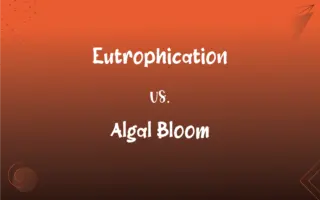Coal Tar vs. Asphalt: What's the Difference?
Edited by Aimie Carlson || By Harlon Moss || Published on February 16, 2024
Coal tar is a byproduct of coal processing, used in medicinal products and sealants, while asphalt, derived from petroleum, is primarily used for road construction.

Key Differences
Coal tar is a thick, black, viscous liquid obtained during the process of coking coal for the steel industry. Asphalt, also known as bitumen, is a sticky, black, and highly viscous liquid or semi-solid form of petroleum, widely used for paving roads.
Coal tar has been historically used in medicinal products for skin conditions like psoriasis and eczema, due to its therapeutic properties. Asphalt is primarily used in construction, particularly for road surfacing, where its binding and waterproofing properties are beneficial.
The composition of coal tar includes a complex mixture of phenols, polycyclic aromatic hydrocarbons (PAHs), and heterocyclic compounds. In contrast, asphalt's composition mainly consists of aliphatic compounds and heterocyclic compounds derived from crude oil.
Coal tar is also used in the production of tar-based sealants, used in roofing and paving, and for preserving wooden structures. Asphalt, on the other hand, is used in the creation of asphalt concrete, a common material for road construction and roofing.
In terms of environmental and health concerns, coal tar can be more hazardous due to the presence of carcinogenic compounds. Asphalt, while also having health considerations, is generally regarded as less toxic compared to coal tar.
ADVERTISEMENT
Comparison Chart
Source
Byproduct of coal processing
Derived from petroleum
Primary Use
Medicinal products, sealants
Road construction, paving
Composition
Complex mixture including phenols and PAHs
Aliphatic compounds, crude oil derivatives
Additional Uses
Tar-based sealants, wood preservation
Asphalt concrete, roofing material
Health Concerns
Carcinogenic compounds present
Less toxic, but with some health considerations
ADVERTISEMENT
Coal Tar and Asphalt Definitions
Coal Tar
Coal tar is a byproduct of the coal coking process.
Coal tar is produced during the steel manufacturing process.
Asphalt
Asphalt composition includes aliphatic compounds from crude oil.
The durability of asphalt is due to its robust composition.
Coal Tar
Coal tar contains phenols and polycyclic aromatic hydrocarbons.
The distinct smell of coal tar comes from its complex chemical composition.
Asphalt
Asphalt is primarily used in road construction and paving.
The construction crew laid asphalt for the new highway.
Coal Tar
Coal tar is used in medicinal products for skin treatment.
She used a coal tar shampoo for her scalp psoriasis.
Asphalt
Asphalt is a sticky, black substance derived from petroleum.
The new road was paved with asphalt for a smooth finish.
Coal Tar
Coal tar is used in producing tar-based sealants and preservatives.
Coal tar sealants are applied to preserve and protect wooden decks.
Asphalt
Asphalt is used in creating asphalt concrete and roofing materials.
Asphalt shingles are commonly used for residential roofing.
Coal Tar
Coal tar poses environmental and health risks.
Handling coal tar requires safety precautions due to its toxic nature.
Asphalt
Asphalt is considered less toxic than coal tar.
Asphalt is preferred for residential areas due to its lower health risks.
Coal Tar
Alternative spelling of coal tar
Asphalt
See bitumen.
Asphalt
A mixture of bitumen with crushed stone gravel or sand, used for paving or roofing.
FAQs
Can asphalt be used for roofing?
Yes, particularly in the form of asphalt shingles.
What is asphalt primarily used for?
It's mainly used for road construction and paving.
Is coal tar used in any medical applications?
Yes, it's used in treatments for skin conditions like psoriasis.
Are there health concerns associated with asphalt?
Yes, but it's generally considered less toxic than coal tar.
What are the main components of coal tar?
It contains a complex mixture of phenols and polycyclic aromatic hydrocarbons.
Is coal tar environmentally hazardous?
Coal tar contains carcinogenic compounds and can pose environmental risks.
Can coal tar be used for wood preservation?
Yes, in the form of tar-based sealants.
Is coal tar used in road construction?
It's not commonly used in road construction but in sealants for paving and roofing.
Is asphalt environmentally friendly?
It has some environmental impacts, but advancements in recycling have made it more eco-friendly.
Can coal tar be used for roofing?
Yes, in the form of coal tar pitch, though it's less common than asphalt.
What is coal tar made from?
Coal tar is a byproduct of the coal coking process in steel manufacturing.
What's the difference in composition between coal tar and asphalt?
Coal tar has phenols and PAHs, while asphalt is mainly aliphatic compounds from crude oil.
Is coal tar still used in medicinal products?
Yes, though its use has decreased due to safety concerns.
How long has asphalt been used in road construction?
Asphalt has been used for road construction for over a century.
How is asphalt produced?
Asphalt is derived from the distillation process of crude oil.
What is the texture of asphalt?
It's sticky, black, and viscous or semi-solid.
Are there alternatives to coal tar in medicinal products?
Yes, there are alternative treatments with fewer health risks.
How is coal tar different from asphalt in sealing applications?
Coal tar is used in more specialized sealants, while asphalt is widely used for general paving.
Is asphalt safe for household use?
Yes, especially in products like roofing materials.
What safety measures should be taken when handling coal tar?
Protective gear and proper ventilation are essential due to its toxic nature.
About Author
Written by
Harlon MossHarlon is a seasoned quality moderator and accomplished content writer for Difference Wiki. An alumnus of the prestigious University of California, he earned his degree in Computer Science. Leveraging his academic background, Harlon brings a meticulous and informed perspective to his work, ensuring content accuracy and excellence.
Edited by
Aimie CarlsonAimie Carlson, holding a master's degree in English literature, is a fervent English language enthusiast. She lends her writing talents to Difference Wiki, a prominent website that specializes in comparisons, offering readers insightful analyses that both captivate and inform.






































































